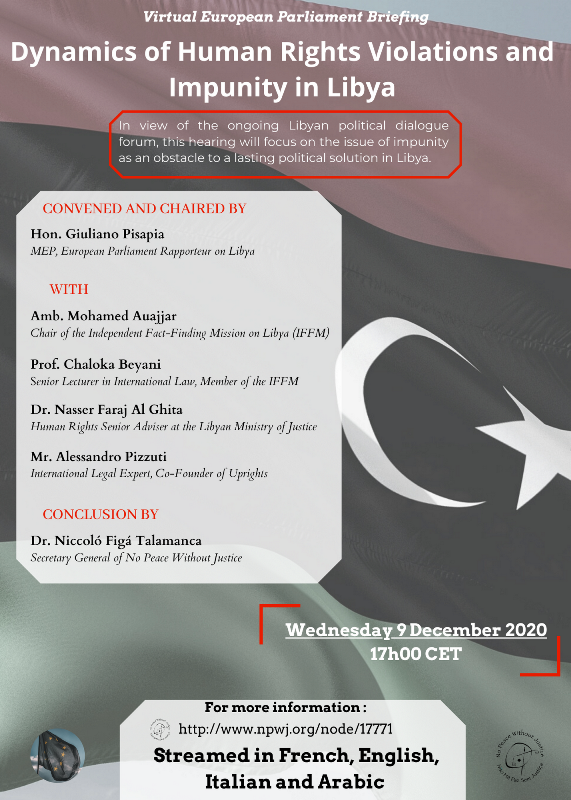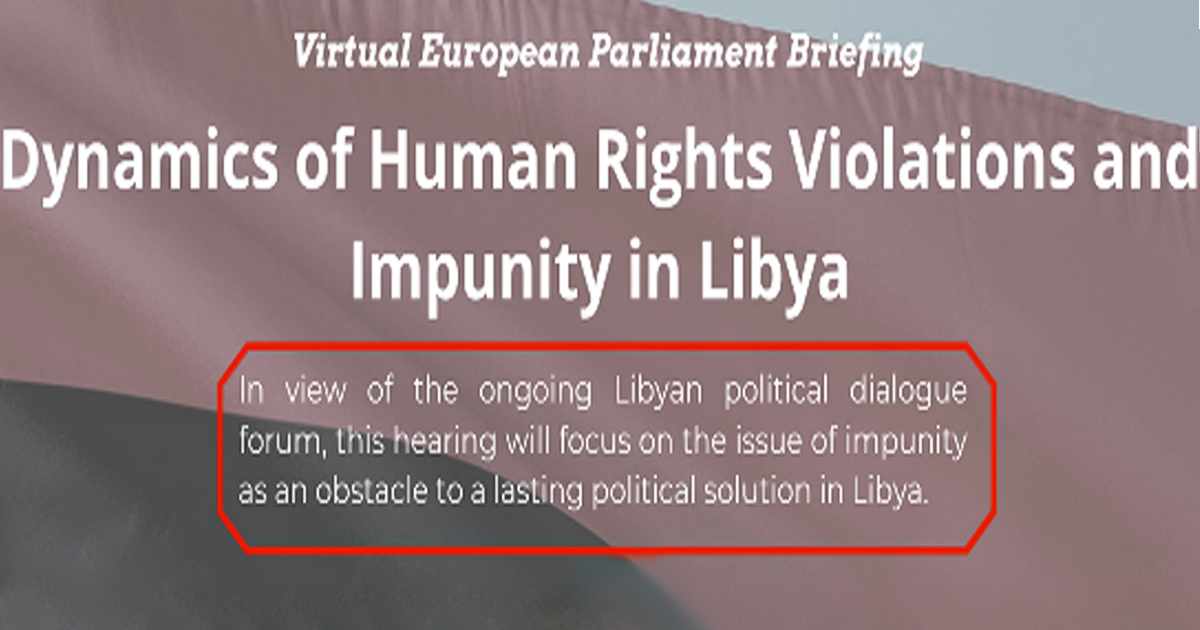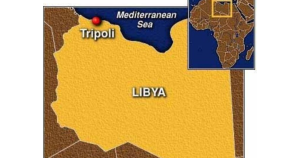Virtual European Parliament Briefing, 9 December 2020
On 9 December 2020, a virtual parliamentary briefing on “Dynamics of Human Rights Violations and Impunity in Libya” was convened and chaired by Hon. Giuliano Pisapia MEP, Standing Rapporteur on Libya for the European Parliament.
In view of the ongoing Libyan political dialogue forum, this hearing focused on the issue of impunity as an obstacle to a lasting political solution in Libya.
Speakers included
– Amb. Mohamed Auajjar, Chair of the Independent Fact-Finding Mission on Libya (IFFM)
– Prof. Chaloka Beyani, Senior Lecturer in International Law, Member of the IFFM
– Dr. Nasser Faraj Al Ghita, Human Rights Senior Adviser at the Libyan Ministry of Justice.
– Mr. Alessando Pizzuti, International Legal expert, Co-Founder of Uprights
– Dr. Niccoló Figá Talamanca, Secretary General of No Peace Without Justice.
- Date: Wednesday 9 December 2020
- Broadcast time: 17h00 CET
- Streamed in French, English, Italian and Arabic
- For info and registration: https://tinyurl.com/eventbrite9Dec20
The full video of the event can be viewed on our social media pages:
Facebook:
- Arabic: https://www.facebook.com/282717801814824/videos/392491905355287
- English: https://www.facebook.com/ncpsg/videos/1768365769983803
- French: https://www.facebook.com/282717801814824/videos/245240710575364/
- Italian: https://www.facebook.com/ncpsg/videos/1094191687668332
Twitter:
- Arabic: https://twitter.com/NpwjPress/status/1337711311438966787
- English: https://twitter.com/NpwjPress/status/1337710845913128961
- French: https://twitter.com/NpwjPress/status/1337713808215842816
- Italian: https://twitter.com/NpwjPress/status/1337713237505306626
Youtube:
- Arabic: https://youtu.be/I99qrzL9VKE
- English: https://youtu.be/IDVr2n40wOk
- French: https://youtu.be/pdJOLXo98lU
- Italian: https://youtu.be/pmkZDEs0YH8
Background
Since mid-2014, the Libyan path to inclusive and representative governance has been thrown into turmoil, as political wrangling between different factions turned into a resumption of open conflict. The political dynamics of impunity for grave human rights violations have effectively rewarded violence with power, and bestowed increased international recognition towards those militia and political leaders willing to commit or countenance widespread and systematic violations against civilians in furtherance of their political objective.
As dramatic details of atrocities and mass graves came to light during the retreat eastern forces, the United Nations Human Rights Council established the Independent Fact-Finding Mission on Libya by resolution 43/39, to investigate violations and abuses of human rights throughout Libya by all parties since the beginning of 2016, with a view to prevent further deterioration of the human rights situation, and to ensure accountability and redress for victims. The first oral Statement of the FFM was delivered to the Human Rights Council on 5 October (link).
At the same time, the International Criminal Court has continued to exercise its mandate in respect of the situation in Libya, which was originally triggered by the United Nations Security Council when it unanimously referred the situation in Libya since 15 February 2011 to the ICC in Resolution 1970 (2011). The investigators thus far produced three cases, originally against five suspects, and has involved charges which include the following crimes: crimes against humanity: murder, imprisonment, torture, persecution and other inhumane acts ; war crimes: murder, torture, cruel treatment and outrages upon personal dignity. Further investigations are ongoing. The Prosecutor has reported on her work to the UN Security Council on 10 November (link).
The European Union and Member States have a crucial role to play in countering the destructive dynamics of impunity and in support of accountability, first of all by supporting the ongoing political dialogue by reaffirming that justice and accountability are not only in the interest of victims who seek redress, but are also a difficult but necessary practical foundation for realistic prospects of peace and stability.





